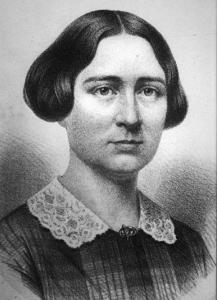Antoinette Louisa Brown was born, today, the 20th of May, 1825, in Henrietta, New York. She was the youngest of Abby & Jospeh Brown’s seven children. Her extraordinary intellectual capacity was noted by the time she turned three. She was also deeply religious, offering prayers and occasion children’s sermons in her local Congregational church.
At sixteen Antionette started teaching, but aspired to seminary. Supported by her progressive parents as well as from savings earned teaching, Antoinette entered Oberlin College in 1846. She completed the literary course in one year. But was denied a degree as she was a woman. Antionette then applied to the divinity program. She was admitted but only under the terms that she would receive no credits, nor a degree in this program, either.
She completed the coursework for the degree, but was, as they said would be the case, denied her diploma. Antoinette then went to work for Frederick Douglass, writing for the North Star. A speech she delivered at the 1850 National Women’s Rights Convention led to a speaking tour and a rising reputation as a public intellectual.
While her spiritual identity was gradually turning toward the Unitarian church, and she’d accepted invitations to preach by both William Ellery Channing and Theodore Parker, Antionette felt a family connection to Congregationalism. And in September 1853, she accepted a call and was ordained minister of the Congregational church in South Butler, New York.
The ordination sermon delivered by the radical Methodist, Reverend Luther Lee, who (cited in Wikipedia) declared “If God and mental and moral culture have not already qualified her,” he said to the crowd assembled for the occasion, “we cannot, by anything we may do by way of ordaining or setting her apart … All we are here to do … is … to subscribe our testimony to the fact, that in our belief, our sister in Christ, Antoinette L. Brown, is one of the ministers of the New Covenant, authorized, qualified, and called by God to preach the gospel of his Son Jesus Christ.”
The denomination refused to license her because she was a woman.
Reverend Brown spent a year at South Butler, but when expected to speak of the damnation of two infants who had died without baptism, she felt she could no longer represent the then dominant Calvinism of the Congregational church, begged health issues, and resigned her pulpit. She returned to the lecture circuit, and threw herself into social work and activism.
Among those whose lives Reverend Brown touched was the equally remarkable Olympia Brown. (Not a relative, at least in the genetic sense…)
Antionette Brown was a passionate abolitionist, and a tireless worker for women’s suffrage. Her fiery oratory was credited for turning many people to the joint causes of abolition and suffrage.
She then met and fell in love with Samuel Charles Blackwell. They married in 1856. A real estate dealer, Samuel was also an abolitionist, and incidentally his brother was married to Antoinette’s friend and fellow activist, Lucy Stone. They had seven children together, five survived to adulthood. Their eldest Florence would eventually become a Methodist minister.
In 1878 Antoinette was received as a minister by the American Unitarian Association.
In 1920, at the age of ninety-five the Reverend Antoinette Brown Blackwell was able to cast her vote in a Federal election.













